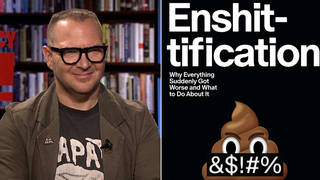
Topics
By Amy Goodman and Denis Moynihan
The for-profit social media giant Facebook harvests vast amounts of data from each of its 2 billion users across the globe. This data trove gives Facebook unparalleled commercial power and, as is becoming increasingly clear, the ability to influence significant events, including national elections. Revelations about Facebook’s role in the exploitation of user data by a company called Cambridge Analytica to support the presidential campaign of Donald Trump, as well as the outcome of the Brexit vote — the referendum leading the United Kingdom to leave the European Union — have provoked widespread calls for tough, new data privacy laws.
For the first time ever, Facebook’s founder and CEO, billionaire Mark Zuckerberg, appeared before Congress for two days of hearings. On Tuesday, among those who questioned him was Illinois Democratic Sen. Dick Durbin:
SEN. DURBIN: “Would you be comfortable sharing with us the name of the hotel you stayed in last night?”
MARK ZUCKERBERG: “Umm, uh, no.”
SEN. DURBIN: “If you’ve messaged anybody this week, would you share with us the names of the people you’ve messaged?”
MARK ZUCKERBERG: “Senator, no, I would probably not choose to do that publicly here.”
SEN. DURBIN: “I think that may be what this is all about: your right to privacy, the limits of your right to privacy, and how much you give away in modern America in the name of, quote, ‘connecting people around the world.’”
The hearings generated much heat but little light, as was predicted by Zeynep Tufekci, a professor at the University of North Carolina and one of the keenest observers of Facebook and our evolving digital landscape. Appearing on the “Democracy Now!” news hour, Tufekci said: “We don’t really need Mark Zuckerberg to explain the very basics of Facebook to a bunch of senators who don’t seem to even understand that. We need to sit down and say, ‘How do we deal with the new information commons? How do we deal with the new public sphere as it operates?’” She added: “People mistakenly think that Facebook sells your data. Facebook doesn’t sell your data. Facebook sells you.”
Cambridge Analytica, co-founded by former Trump adviser Stephen Bannon and billionaire Trump supporter and extreme right-wing ideologue Robert Mercer, claimed it could create “psychographic profiles” of people based on their Facebook data. A company whistleblower revealed that they advised the Trump campaign on how to target ads, both to boost Trump and suppress Democratic voter turnout.
The wholesale, planetwide exploitation of personal data has dark implications, Zeynep Tufekci said: “We could enter into a phase of ‘surveillance authoritarianism,’ where we don’t face [George Orwell’s] ‘1984’ model, where there’s open totalitarianism, where we’re dragged off in the middle of the night. But we’re silently and quietly, person by person, screen by screen, nudged and manipulated according to our individual vulnerabilities.”
Tufekci says the targeting specificity that Facebook user data allows is chilling, giving as an example the ability to determine if a person is bipolar: “You can predict people’s likelihood of entering a depressive state or a manic state in the next few months … you can imagine the kind of manipulation that it’s open to.” Cheap flights to Las Vegas, she gave as an example, could be offered to people when their Facebook activity indicated they were entering a manic phase and might be more easily induced to make a rash purchase.
And then there are young children. That is a population recently targeted by Facebook with the development of its application “Facebook Messenger Kids.” This would allow Facebook to recruit new users younger than the current minimum age of 13, even as young as 6. The Campaign for a Commercial-Free Childhood is pushing to end the app.
“There is a wealth of research that shows that social media is harmful to adolescents, that excessive time on social media is linked to things like depression, unhappiness. Girls who are on social media are more likely to feel dissatisfied about their bodies,” Josh Golin, executive director of the advocacy group, said on “Democracy Now!” “Here is Facebook knowing this research and deliberately trying to get even younger kids to use their platform … the last thing that kids need is to normalize this idea that relationships should take place online, that relationships should take place through a commercial product.”
Facebook, Google, Twitter and other social media platforms have become central to our modern, digitally connected lives. But evidence is mounting that who we “friend,” what we “like” and share, can be used by malevolent groups to target entire swaths of the population with a few keystrokes. If democracy is to survive in this brave new world, mass movements of people will need to organize together to restrain these corporate behemoths and protect our digital commons.












Media Options